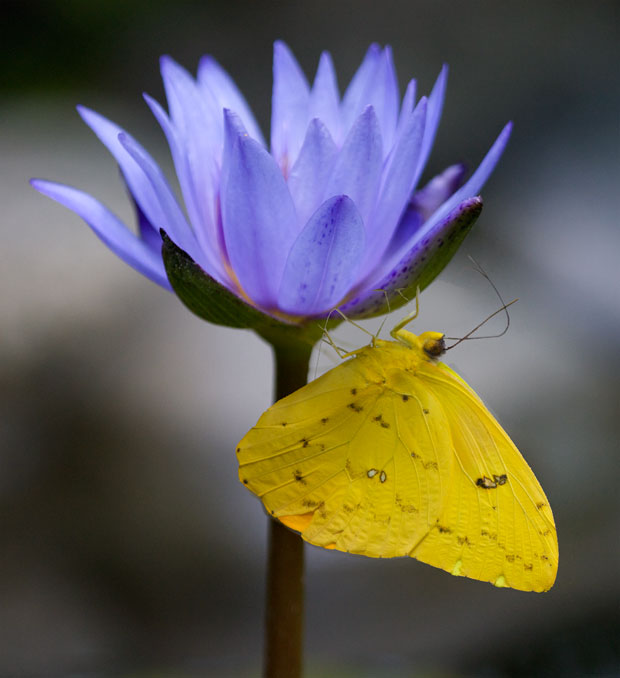
Approaching the Light


Having read nearly 300 pages of Ueda’s Basho and His Interpreters, I find that my favorite poems still tend to be those that are the most concrete and that require the least knowledge of Japanese culture or Japanese literature:
a dragonfly
vainly trying to settle
onto a blade of grass
tonbô / ya / toritsuki / kaneshi / kusa / no / ue
dragonfly / :/ holding / is-unable / grass / ‘s / upside
COMMENTARY
In general short verse form, as it evolves with time, tends to focus more and more on things minute and delicate. This hokku shows the beginning of that tendency – Handa
This looks likes simple descriptive poem, and yet it makes us wonder whether Basho’s eyes were not observing something important in the very heart of nature. – Momota
Of course, this poem reminds me a number of summer photographs I took, like this one,
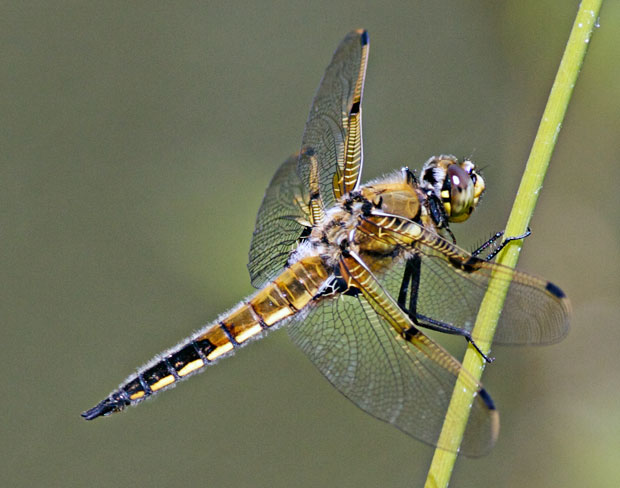
so it’s probably not surprising it’s one of my favorites.
I’m enjoying reading Ueda’s Basho and His Interpreters, though at times it seems more like being immersed in a mini-class than casually reading a poetry book. The more I read, particularly the commentary, the more I realize how much I don’t know about Japanese literature and culture, though I am finding many new ideas to explore.
As I’ve noted in past commentary, I may enjoy haibunas much as I do haiku. One of my favorite haiku in this section seems much more effective to me when the “headnote” is included:
I arrived at my native town at the beginning of the ninth month. Nothing of my late mother remained there anymore. All had changed from what I remembered. My older brother, now with white hair in his side-locks and wrinkles around his eyebrows, could only say, “How lucky we are to meet alive again!” Then he opened a keepsake bag and said to me “Pay your respects to Mother’s white hair. They say the legendary Urashima’s hair turned white the instant he opened the souvenir box he had brought back from the Dragon Palace. Now your eyebrows look a little white, too.” We wept together for some time.
should I hold it in my hand
it would melt in my hot tears-
autumn frost
te / nil toraba / kien / namida / zo / atsuki / aki / no / shimo
hand / in / if-take / will-vanish / tear / ! / hot / autumn / ‘s / frost
NOTE
Written in Ueno on October 16. Urashima was the young hero of a legend who visited a Dragon Lady’s palace under the sea. Returning to his native village and finding nothing there that he could remember, he disobeyed the lady’s order and opened a jewel box she had given him. Instantly he turned into an old man.
COMMENTARY
The comparison here is between frost and white hair. The word “hot” connotes an infinitely deep sorrow, while the words “would melt” -kien–have a sonorous sound. -Tosai
The poet is saying he cannot take the white hair in his hand because if he were to do so his hot tears would melt it away like autumn frost. In brief, this is a hok1 that depends far too much on a logical connection of ideas. In addition, it still retains something of the old style that characterized Minashiguri. I do not find it poetically appealing. – Meisetsu
An excellent poem which, without any verbal adornment, fully reveals the poets honest, sincere personality. -Kobayashi
The poet just could not contain his grief. -Ebara
The poem’s central metaphor-that of autumn frost-is a failure. In particular, the statement that the frost would melt in hot tears sounds hollow and unconvincing. We can visualize the grieving poet, but the poem does not convey the grief in a manner that moves the heart. – Shüson
I think it can safely be said that few other poems make us so sublimely conscious that nature and humanity are one. -Komiya
The underlying emotionality of the poem is manifest in the wave-like rhythm of the verse. However, if we read the hokku independently of the headnote, we get the impression that the wording of the poem does not do justice to the intensity 0f the poet’s emotion. A poem of this kind needs to be read with its headnote to be fully appreciated. -Iwata
While the haiku may be able to stand on its own, I agree wholeheartedly with what Iwata says in the last comment. With the headnote it reminds me of one of Thoreau’s essays which he concludes with a powerful aphorism. I suppose you could even consider it a unique type of prose poem.
We woke to snow-dusted cars and heavy clouds again yesterday. But just before noon, the clouds miraculously cleared, and the sun suddenly appeared. I knew there wasn’t time to actually drive anywhere, since the sun would probably have disappeared before I could get there.
So I simply drove the short distance to Owen Beach to get pictures. There weren’t a lot of birds, certainly not a one I haven’t gotten shots of before, but I’d be a fool to complain about walking the beach on a sunny, crisp winter day.
This Horned Grebe in its non-breeding colors was the first grebe I spotted.
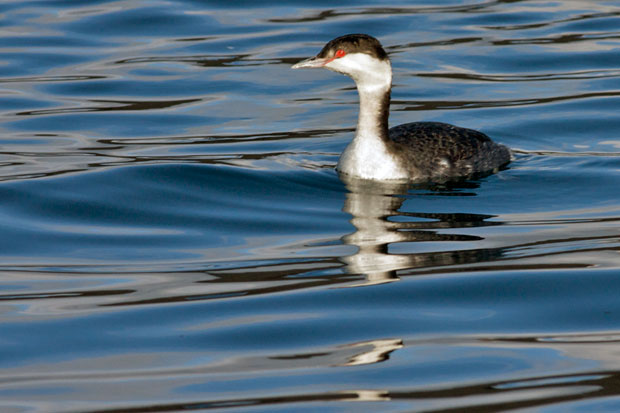
Later I spotted a larger Red-Necked Grebe, also in non-breeding colors, further out.
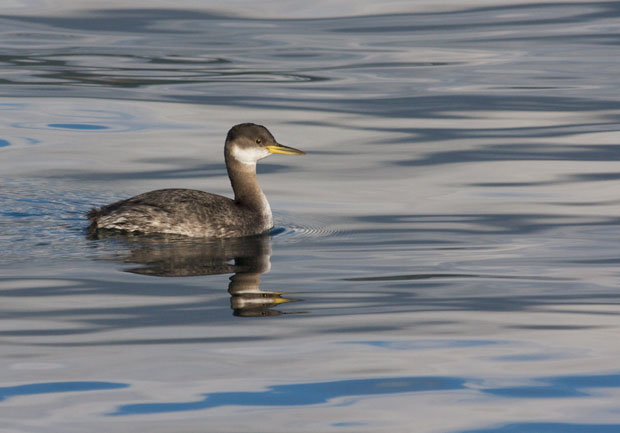
But the best shot of the day was of this pair of Common Goldeneye.
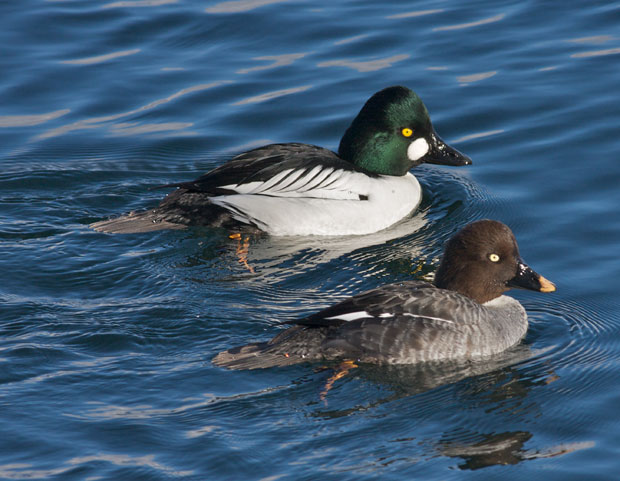
The day was only slightly marred by my brief encounter with a coast guard craft that was passing by but swung about and came over and “questioned me,” at least that’s the way the lady walking on the shore and I interpreted their actions.
Hey, I wasn’t even wearing my usual camouflage jacket, just carrying my Canon 400mm lens. They were actually quite pleasant, though the sight of the .762 machine gun mounted on the front of the boat and the flashing blue lights proved slightly unnerving. Apparently birding is more subversive than I was originally led to believe.
I would have liked to get a picture of the boat but decided I wouldn’t push my luck by training my camera on their boat as they left.